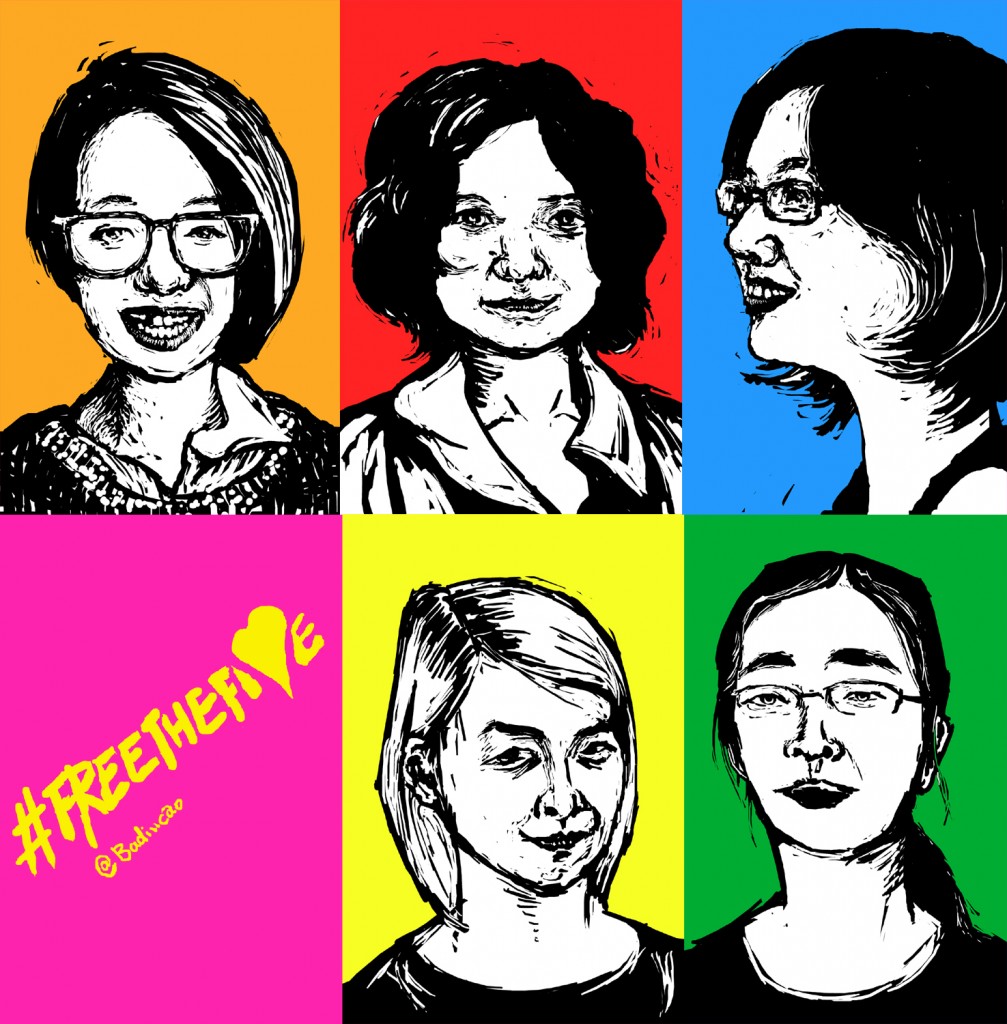Happy Women’s Day! A poster from China in 1960, to commemorate the 50th anniversary of the day. pic.twitter.com/8CW21TJAjR
— China in Pictures (@tongbingxue) March 8, 2018
In recent years, International Women’s Day has been celebrated primarily as another consumer holiday in China, with many women getting half a day off work in an effort to boost spending. Official media celebrated the day by displaying images of women in traditional roles or as icons of beauty, while activists in China protested the commercialization of the holiday:
Life-savers sport embroidered cheongsams! Female nurses and doctors in Wuhan, Central China's Hubei province, attend a reading party on International #WomensDay. (Photo: VCG) pic.twitter.com/8GkNwmlBOQ
— China Daily (@ChinaDaily) March 8, 2018
#VictoriasSecret angels shine at an event in #Shanghai , E China (Photos: Xinhua) #Womensday pic.twitter.com/cBCIkke6iR
— Global Times (@globaltimesnews) March 8, 2017
https://twitter.com/Yangguobin/status/971869381083803648
https://twitter.com/LetaHong/status/971417902992777216
While some official accounts lauded actions of women fighting for their rights around the world, little attention was paid in state media to Chinese women’s efforts to do the same:
Over 2,500 Saudi women join a parade in Jeddah on the #WomensDay, first massive public appearance of Saudi women in the conservative kingdom https://t.co/boZi9tdUBB pic.twitter.com/puKuX1Ommn
— China Xinhua News (@XHNews) March 8, 2018
Women still less likely to be active in labor market than men; "women's prospects in the world of work are still a long way from being equal to men's": @ILO #WomensDay https://t.co/yxQVhkNww0 pic.twitter.com/B5C9IecoJ9
— China Xinhua News (@XHNews) March 8, 2018
Women participate in a rally marking the International #WomensDay with the theme of "Press for Progress" in Kathmandu, Nepal, March 8, 2018. (Photos: Xinhua) https://t.co/TkT1VqTG6y pic.twitter.com/OCBIjVt3kB
— Global Times (@globaltimesnews) March 8, 2018
Can't say I'm surprised. If you search "anti-sexual harassment" on Weibo you'd only see scandals and protests in other countries (Korea, U.S. etc). Nothing domestic. 强国没有性骚扰。 https://t.co/9hOxIpKYLV
— Sandra (@underbreath) March 9, 2018
Yet, as many others pointed out, within China there is still plenty to protest. In many ways, progress for women’s rights has reversed in recent years. Sexual harassment is still rampant, and a nascent Chinese #metoo movement has faced ongoing barriers. Journalists in particular face sexual harassment on the job; a recent study found that 80% of Chinese journalists had faced “unwanted sexual behavior, demands, language, and non-verbal or physical contact” inflicted by either a manager or a co-worker. In the workplace, Chinese women routinely earn an average of 22% less than their male counterparts, while culturally embedded notions of women’s place in society emphasize their subservient role to men. In job interviews, women are frequently asked about their marital and pregnancy status, in violation of anti-discrimination laws. Activists who work to change the status quo are often censored or otherwise silenced.
The #genderpaygap is actually worse in China than it was decades ago. Women make 67% of what men make in same jobs. @LenoraChu #womensday #mettooinchina #metoo #Nuvoices #paygap pic.twitter.com/zGkTa1U2AO
— Joanna Chiu (@joannachiu) March 8, 2018
On #InternationalWomensDay , Weibo deleted hashtag "anti-sexual harassment" and its page; posts related to sexual harassment are censored. Only cheesy stories and misogynistic comments are allowed. https://t.co/u1sCpB8Fw8
— Sandra (@underbreath) March 8, 2018
Feminist Voices, the preeminent social media group speaking out for women’s rights, was shut down a day after International Women’s Day; they were similarly shuttered one year ago:
https://twitter.com/LetaHong/status/971877545833529344
Outside of official media, many people have been sharing valuable resources to highlight the powerful work by women working in or about China. Journalist Joanna Chiu was interviewed by SupChina about two new initiatives to focus attention on the work of writers of Chinese origin or who write about China. Her Greater China Female Experts Open Directory lists over 400 female experts who specialize in a range of topics on China. Chiu’s second project, NüVoices, is a newly launched editorial collective “gathering veteran and emerging writers, journalists, translators and artists to celebrate and support the diverse creative work of women working on the subject of China (broadly defined).”
Time Out Beijing listed the “best books on women in China,” while the New York Times profiled feminist poet and revolutionary Qiu Jin as part of a series of retroactive obituaries for women who had been overlooked by history:
Qiu Jin 1875-1907
With her passion for wine and bomb making, Qiu Jin was unlike most women born in late 19th-century China. She is often referred to as “China’s Joan of Arc.”https://t.co/QKtdm4fG4y pic.twitter.com/2zwk3iIlZU
— The New York Times (@nytimes) March 8, 2018
Other suggested readings:
1/ For #InternationalWomensDay we're highlighting some of the ground-breaking books by the incredible women on our faculty:
— Fairbank Center, Harvard University (@FairbankCenter) March 8, 2018
Radii's profiling Chinese women filmmakers all week 👇🏼👇🏼👇🏼 https://t.co/EkKBmcsR5u
— chris xu (@xuhulk) March 8, 2018
International affairs publications are still dominated by men, but our World Policy Interrupted issue demonstrates that their pages can be filled, just as skillfully, by women. To mark #InternationalWomensDay we've made select pieces available for free:https://t.co/Yj3L9f6sSs
— World Policy (@WorldPolicy) March 8, 2018
https://twitter.com/mauracunningham/status/971795971570061313
"Finding Women in the State —
A Socialist Feminist Revolution in the People’s Republic of China, 1949-1964," a #video interview with author Wang Zheng on #InternationalWomenDay2018 https://t.co/Hbx2mFGbvs pic.twitter.com/9trRMDUx3x— ChinaFile (@ChinaFile) March 8, 2018
For #WomensDay, we would like to highlight some of China's most thoughtful and outspoken activists, thinkers and writers, starting with the Feminist Five: https://t.co/sIYxeFlNKj (1/8)
— China Digital Times (@CDT) March 8, 2018








